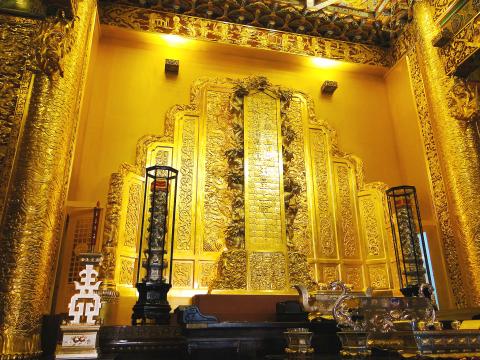After three months in the making, the Nan Kun Shun Temple in Greater Tainan unveiled a stele made from pure gold on Thursday last week, which has been touted by the temple as the most glorious of its kind in the world.
The stele is 6.6m high, 2m wide and 60cm thick and made from 10,800 liang (兩), or 405kg, of gold worth about NT$600 million (US$20.6 million), the temple said, adding the stele would be placed in the complex’ newly finished Ling Hsiao Temple.
The Temple chief executive Hou Hsien-hsun (侯賢遜) said the gold came from three sources, including donations from worshipers which amounted to roughly 75kg, purchases by followers of the temple for the purpose of making the stele and purchases by the temple itself.

Photo: Huang Po-lang, Taipei Times
The temple — due to security risks and the difficulty of working with so much gold outdoors — hired three experienced goldsmiths to work inside the temple for three months.
To make sure that none of the gold was stolen or taken from the site, the temple also hired 24-hour security to watch over the stele and used metal detectors to scan the goldsmiths as they entered or left the premises.
The temple’s management committee said that because of the diverse qualities of the temple’s followers, it had to make a stele that was different to others, adding that the stele emphasizes the inner qualities of the temple’s adherents.
The stele would be walled off on public occasions, Hou said.
During its construction, worshipers who visited to the temple were not aware of what the stelewas, with some even saying they thought the stele had just been painted over with gold paint or decorated with thin golden sheets.
Built in 1662, the Nan Kun Shun Temple is the center of the Wangye belief in Taiwan and is the home of the Wu Fu Chien Hsui (五府千歲), the five different deities of different surnames. There are more than 20,000 Wangye temples scattered across the nation.
Wangye belief is concentrated in southern and western Taiwan. The Wangyes were considered major deities in both the Taoism and in local beliefs and were considered the representatives of Heaven with a mandate to grant blessings or curses upon humankind.
The temple has been designated a national heritage site and was also given three stars by the Michelin Green Guide.
According to the temple’s management committee chairman, Wang Lien-hsing (王連興), the deities repeatedly gave divine instructions for the construction of the Ling Hsiao Temple, and after 50 years of planning the committee finally had a “shifting the earth” (動土) ceremony in 1984 and started construction in 1993.
In Taiwanese and Chinese tradition, there are ceremonies to be observed prior to the construction of a building.
“Shifting the Earth” is one such ceremony, in which people wishing to erect a structure make offerings to the various spirits on the land, telling them what they intend to construct.
The temple was finished this year and the committee is planning to hold a ceremony announcing the new temple tomorrow.
Such a ceremony is normal for new religious buildings or in instances when a deity has been moved from one location to another.
A general offering is made to the ghosts around the temple so they do not taint the new location.
After announcing the divine will of the heavens, the person conducting the ceremony — who is dressed as Chung Kuei (鍾馗), a deity of the underworld specifically tasked with capturing and sometimes eating wayward ghosts and spirits — steps across seven basins of fire in the shape of the Big Dipper star constellation. The action clears the way for the deity to be installed in the new temple.
The committee spared no effort in the construction of the new temple, even going so far as to ask Chinese calligraphers around the nation to submit writing samples before choosing which calligraphers’ work would be carved on the beams and pillars of the main and side halls as well as the Tai Sui Temple and the Wen Chang Temple, which form part of the complex.
The Tai Sui Temple is a temple for those who believe that their luck has run out and need the blessings of Tai Sui (太歲) to diminish their misfortune.
Wen Chang (文昌) is a traditional Taoist deity that blesses both generals and writers and is in charge of all literary endeavors.
There are about 2,500 paintings and drawings decorating the various temples in the complex.
The temple’s 9th Kungshen Wangye’s Salt of Peace Festival is set to be held on Saturday and Sunday, the temple said, adding that tourists and worshipers may catch buses at the temple for a trip to the salt fields in Jingzaijiao (井仔腳).

GENSLER SURVEY: ‘Economic infrastructure is not enough. A city needs to inspire pride, offer moments of joy and foster a sense of belonging,’ the company said Taipei was named the city with the “highest staying power” in the world by US-based design and architecture firm Gensler. The Taiwanese capital earned the top spot among 65 cities across six continents with 64 percent of Taipei respondents in a survey of 33,000 people saying they wanted to stay in the city. Rounding out the top five were Vietnam’s Ho Chi Minh City (61 percent), Singapore (59 percent), Sydney (58 percent) and Berlin (51 percent). Sixth to 10th place went to Monterrey, Mexico; Munich, Germany; Sao Paulo, Brazil; Vancouver; and Seoul. Cities in the US were ranked separately, with Minneapolis first at

The Japan-Taiwan Exchange Association has cautioned Japanese travelers to be vigilant against pickpockets at several popular tourist spots in Taiwan, including Taipei’s night markets, the Yongkang Street area, Zhongshan MRT Station, and Jiufen (九份) in New Taipei City. The advisory, titled “Recent Development of Concerns,” was posted on the association’s Web site under its safety and emergency report section. It urges travelers to keep backpacks fully zipped and carried in front, with valuables placed at the bottom of the bag. Visitors are advised to be especially mindful of their belongings when taking photos or speaking on the phone, avoid storing wallets and

Scoot announced yesterday that starting in October, it would increase flights between Taipei and Japan’s Narita airport and Hokkaido, and between Singapore and Taipei. The low-cost airline, a subsidiary of Singapore Airlines, also said it would launch flights to Chiang Rai in Thailand, Okinawa and Tokyo’s Haneda airport between December and March next year. Flights between Singapore and Chiang Rai would begin on Jan. 1, with five flights per week operated by an Embraer E190-E2 aircraft, Scoot said. Flights between Singapore and Okinawa would begin on Dec. 15, with three flights per week operated by Airbus A320 aircraft, the airline said. Services between Singapore

ENDORSING TAIWAN: Honduran presidential candidate Nasry Afura said that Honduras was ‘100 times better off’ when it was allied with Taipei The Ministry of Foreign Affairs yesterday said it would explore the possibility of restoring diplomatic relations with Honduras based on the principle of maintaining national interests and dignity. The ministry made the remarks in response to reporters’ questions regarding an article titled: “Will Taiwan Regain a Diplomatic Ally?” published in The Diplomat on Saturday. The article said Honduras’ presidential election in November could offer Taiwan the chance to regain an ally, as multiple candidates have promoted re-establishing diplomatic relations with Taiwan. Honduras severed diplomatic ties with Taiwan in March 2023 in favor of Beijing, but since switching its diplomatic recognition,